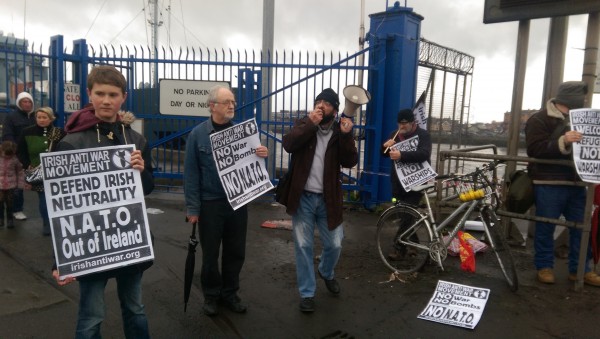
Image provided by Maria Shields O’Kelly (NewsFour)
The weekend of Saturday 2 and Sunday 3 April was quite the event with six NATO ships entering Dublin Port for the public’s viewing.
This fleet was founded in 1973 to maintain the safety of vessels approaching and navigating their way through the English channel and the Northwest of Europe, and it has trained with several NATO members and partners and been involved in a variety of multinational exercises. NATO stated prior to their arrival that these ships are mainly used for minehunting exercises in which unexploded bombs, torpedoes, shells and mines from both World Wars are handled.
But the reaction to the presence of the ships has not all been positive. They were met with objection by the Irish Anti-War Movement, who on the Sunday held a protest to voice their disapproval.
Among the protestors was Memet Uludag, a socialist, anti-war and anti-racist activist who represented People Before Profit in the 2014 local elections. NewsFour’s own Maria Shields O’Kelly spoke to Uludag to learn the reasons for making a stand, and he believes that the fleet has been put to other uses that NATO are not sharing:
“We are here today as the Irish Anti-War Movement, because this country is a neutral country and these ships now berthed at Dublin Port are part of the military might of NATO. They have been involved over the last 10 to 15 years in invasions and wars in Iraq, Afghanistan, Libya and the whole Middle East.
These ships are part of the problem that we know today as refugees. As we speak today, they are preventing refugees in the Indian Sea from crossing into the relatively safe turf of the European Union. The patrolling of the civilian waters has actually been sub-contracted to military ships.
We are here today predominantly to say that Ireland is a neutral country, NATO is a military force and as citizens of this country we don’t want a military force coming in and presenting itself as if these are just ordinary ships that people should come and visit.”
Maria then asked what message he would like to give to the people who are interested in coming to see the ships. He encouraged the public to look past the spectacle and consider the bigger picture:
“These are interesting machines when you look at them. These are just machines that gain interest from people wondering what they are. It’s normal and natural. But we like to appeal to people that even if they come and see these ships, there is a wider and bigger agenda.
It’s not just about the metal ships berthed in our docks. It’s about what they mean in the global sense and the context of Ireland, and especially the neutrality of Ireland. When is neutrality not neutrality? When can we have neutrality as we think and as we choose? Neutrality means neutrality, and we can’t be involved in inviting warships into our port. Ireland is not part of NATO.”
By Kevin Carney



